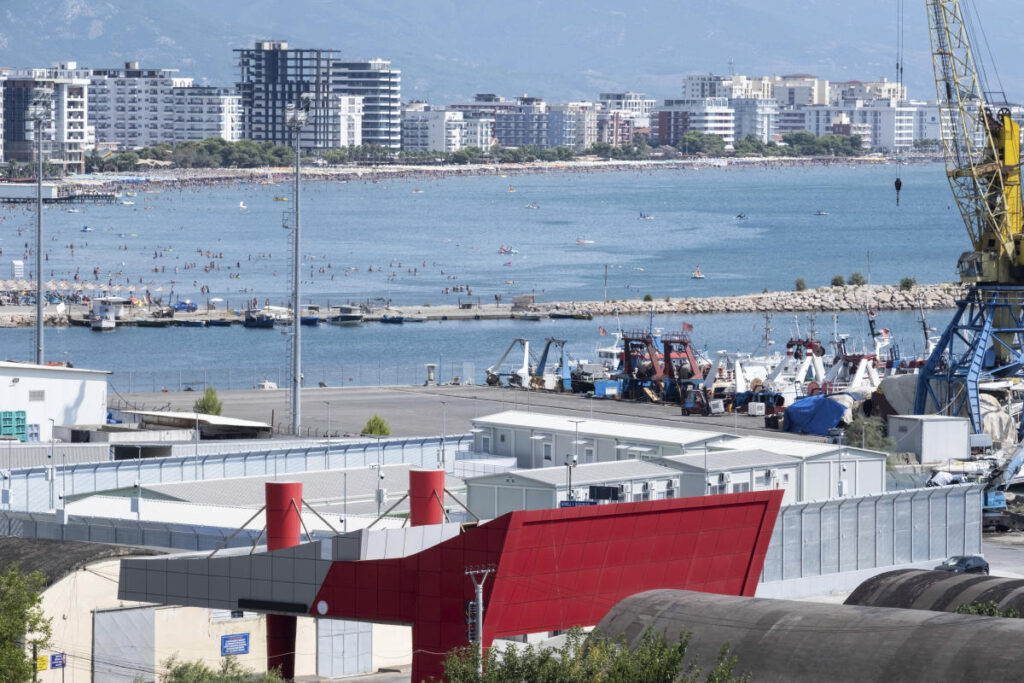On a recent Wednesday, the Italian naval ship Libra embarked on a journey to Albania, carrying migrants whose asylum applications are processed as part of a controversial agreement to manage asylum claims outside the European Union’s borders. This five-year deal, aimed at diminishing the influx of migrants arriving in Italy, has already encountered significant legal obstacles. An official from Italy’s interior ministry confirmed the ship’s direction but withheld details regarding the number of migrants on board and its expected arrival time. Reports indicate that, out of over 1,200 migrants who arrived on the island of Lampedusa in just two days, only eight male adults traveling alone were eligible for processing in Albania based on the criteria that they come from “safe” countries suitable for repatriation.
The Libra, designed to accommodate a maximum of 200 people in addition to its crew, is anticipated to reach the Albanian port of Shengjin by early Friday. This marks only the second transfer of migrants under this new system, following an initial attempt that resulted in the return of migrants after a court in Rome determined their countries of origin—Bangladesh and Egypt—were deemed unsafe. This legal ruling effectively thwarted the implementation of the transfer program, raising questions about its viability. The situation underscores the difficulties encountered in repatriating migrants to nations where human rights concerns prevail, reflecting the complexities of international asylum processes.
Italian Prime Minister Giorgia Meloni, who leads the country’s first far-right government since World War II, has expressed frustration with the judicial decisions impeding the asylum program. Meloni, in advocating for the centers intended to manage up to 3,000 migrant applications per month, argues that any designation of countries like Bangladesh and Egypt as unsafe essentially renders the program unworkable. She emphasized that such legal rulings could potentially hinder the government’s ability to repatriate migrants arriving in Italy, thus emphasizing the need for reforms in the asylum application processing system.
Despite the Italian government’s ambitious plans, human rights activists have raised alarm over the implications of the deal with Albania. They argue that processing asylum applications outside of the EU not only poses a threat to the rights of migrants but also establishes a precedent that could compromise international protections for those seeking refuge. Critics claim that outsourcing asylum processing to countries with questionable human rights records could lead to further mistreatment and disregard for the dignified treatment of vulnerable populations, ultimately challenging the core values of European asylum policies.
The situation in Italy reflects broader dynamics across Europe concerning migration and asylum management. Several countries are grappling with the increasing number of arrivals and the subsequent pressures on their border systems. The Milan government’s response, including agreements with nations like Albania, highlights a shift towards more stringent measures aimed at curbing irregular migration. However, the legal hurdles and ongoing criticism from humanitarian groups signal that such policies may not be as effective as intended and could provoke public backlash regarding the treatment of asylum seekers.
In summary, the case of the Italian naval ship Libra symbolizes the challenges and controversies surrounding Europe’s approach to migration and asylum processing. As Italy navigates the complexities of handling increased migrant arrivals through agreements with third countries, the perceived safety of these nations for repatriation remains in question. The ramifications of Italy’s new policies will likely resonate beyond its borders, affecting the future of EU-wide migration strategies and raising fundamental questions about the balance between national security and humanitarian obligations.

